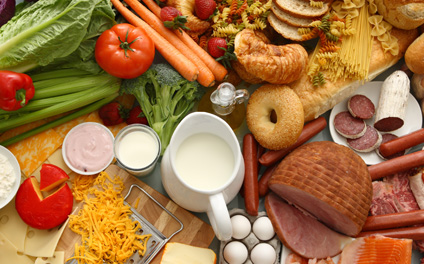Calories aren’t always thought of in the best light. Whether we’re counting calories or cutting calories, we never seem to give a ‘hip-hip-hooray’ for all that calories do for us. Calories are absolutely essential to keep us alive and going. They provide the energy needed to function: to keep body parts and organs moving, to grow hair, to walk and talk, to think, to sleep, to exercise, and so much more!
Where do calories come from?
Calories come from four food components: carbohydrates, protein, fat, and alcohol.
- Carbohydrates break down into glucose once consumed. They are the preferred source of energy for the body and the only source of energy for the brain. They contribute 4 calories per gram. For example, a ½ cup of blueberries weighs about 10 grams. Because blueberries do not contain significant amounts of protein or fat, we can determine that this ½ cup equals 40 calories.
- Protein is the building block of our bodies, helping to create and maintain cells, organs, muscles, tissues, enzymes, hormones, and antibodies. Like carbohydrates, protein provides 4 calories per gram.
- Fat is denser than carbohydrates and protein, providing 9 calories per gram. Some foods are pure fat—like oils, butters, and shortening. However, fat is usually hidden in foods that also contain carbohydrates and protein—like meats, cheeses, dressings and sauces, baked goods, and fried foods. These foods are higher in calories than others—like fruits and vegetables, for example—because they contain fat.
- Alcohol is not a necessary or recommended source of calories because it does not provide any nutritional value—and because it can increase risk of health problems, injuries, birth defects, and alcohol abuse. Alcohol contributes 7 calories per gram.
Are there good vs. bad calories?
Yes and no. Just like there are no hard and fast rules for good vs. bad foods, there are no strict guidelines for good vs. bad calories. However, some calories have much more nutritional value than others. These calories are found in nutrient-dense foods, which are foods that pack a whole lot of nutritional punch (fiber, vitamins, minerals, phytochemicals, etc.). Nutrient-dense foods include fruits, vegetables, whole grains, low-fat dairy, and lean meats and protein foods—our nutritional champions!
On the other side of the coin are energy-dense foods, which provide a whole lot of calories without many nutrients. These foods, often containing refined grain products, solid fats, and added sugars, provide what are called empty calories. To make calories work for you, you want to focus on the nutrient-rich foods and limit the energy-dense foods, to get the most nutritional and energy-packed bang for your buck.
How many calories do you need?
Each of us requires our own unique number of calories each day. Our calorie requirements depend upon our gender, age, height and weight, and physical activity level. For example, a 22-year old male college athlete weighing 210 lbs., standing at 6’6”, may require about 3200 calories per day. However, a 55-year old woman, 150 lbs. and 5’6” who is lightly active, walking or gardening for 20-30 minutes most days of the week, requires about 1800 calories per day. Many meal plans, as well as the % Daily Value amounts listed on nutrition facts labels, are based on a 2000 calorie per day diet, as this is an average intake among Americans.
Note that calorie needs may also shift if you are trying to lose or gain weight. Remember that many of us eat too many calories and need to cut back to maintain or reach a healthy weight. It is the number of calories you eat—from both nutrient-dense and energy-dense foods—compared to the energy you use in your daily activities and any additional physical activity that determines whether you gain, lose, or maintain your weight. To determine how many calories you need—and to receive a customized Daily Food Plan—visit the MyPlate website. For more personalized information about your calorie needs, talk with your doctor or dietitian. Visit the Academy of Nutrition & Dietetics’ website to find a registered dietitian in your area.
How can you keep your calorie intake in check?
Calorie counting is not necessary for everyone, although for many of us it can be helpful to spend a few days logging what you eat to assess where your calories are coming from. There are several similar tools available out there, including many smartphone apps.
For those of us not interested in calorie counting, simply being mindful of the types of foods we eat and the amounts of foods we eat will help us to keep our average daily calorie intake where it needs to be. Choose mostly nutrient-dense foods for their nutritional quality—and to satisfy you before you can over-indulge in energy-dense foods. Know what typical portion sizes are for various foods and try to keep portions in check even in the face of an all-you-can-eat buffet or free soda refills. When eating at restaurants, be aware that portion sizes are often large. To keep from eating too many calories when dining out, choose Healthy Dining options, share a meal, or plan to take leftovers home for a second meal the next day.

